Have you ever had to choose a photo to represent yourself?
If you have, you will know it is not done carelessly or without consideration. Why? Because you want it to represent you well. This is a value that Compassion holds for the children we serve. We want to represent them well—with dignity, honesty and care.
It is said that a picture speaks a thousand words. How true! And this means we are responsible for what they convey. The children we serve live in extreme poverty, often facing untold challenges and witnessing the harsh realities of life. But this is not the defining narrative of their story.
They are smart, funny, caring, dynamic kids full of potential and life. This is why we must protect their dignity, capture moments with integrity and represent them well.
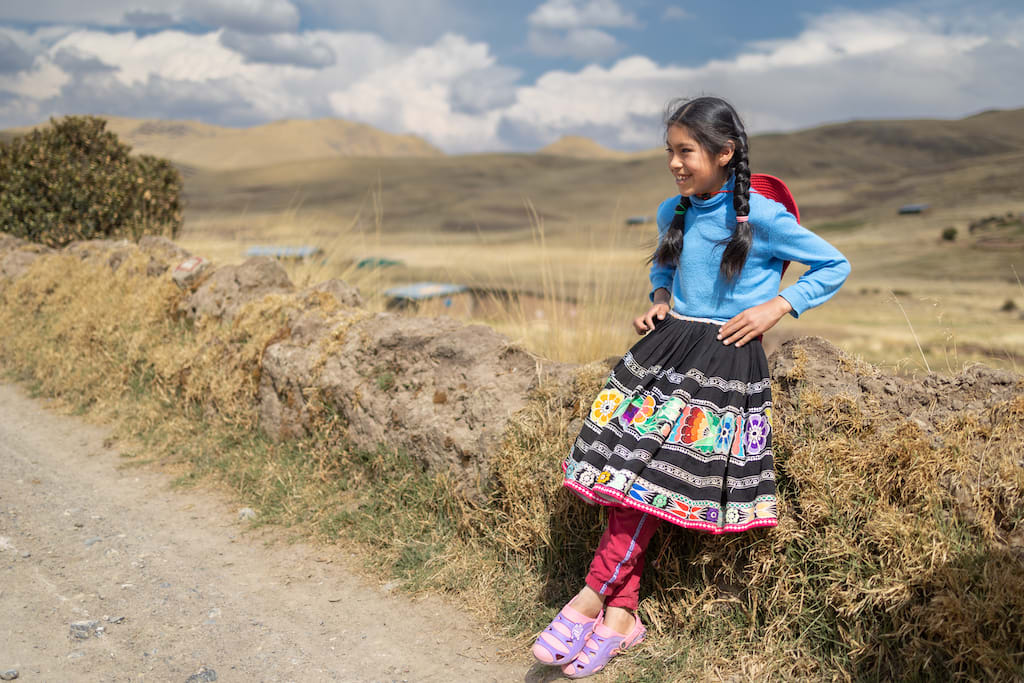
No one does this better than our amazing Compassion photojournalists. Every story they capture conveys the rich complexity of these children and their lives. Our photojournalists know, love and protect Compassion kids, and uphold a standard that dignifies every child as they listen to, capture and compile their stories.
Today, you are invited behind the scenes of the Compassion stories you know and love to meet the passionate men and women who capture them with dignity, honesty and care.
Come hear in their own words what they keep in the forefront while capturing stories with dignity.
J. Sangma, Bangladesh

A stunning image taken by J. Sangma.
When I signed up as a photojournalist, I thought the role would involve producing good-quality photos. I didn’t expect that my responsibilities would demand so much more. Since my first assignment, I have had to use all my knowledge and more to reach out to the unheard voices that didn’t have hope—families who can only see a light in the darkness because of their Compassion centre.
Coming from an ethnic minority community group in Bangladesh, I used to think we were the only ones being oppressed of our rights and opportunities. Perhaps not so surprisingly, we weren’t alone. In my journey with Compassion, I have learned that poverty lurks in every community around the globe, weighing down families who are trying to get to the surface.

A powerful picture from Bobita’s story on our blog. Image taken by J. Sangma.
On the flip side, poverty is not always a sad story. I had a lot to learn from the children and their families about rising like a phoenix when everything seemed lost. I have no idea what the experience would be like if my home was destroyed by cyclones and floods.
But witnessing communities rebuild was a blessing, as I learned what it means to never lose hope. Even though they have little, there are many families who insist on offering you a cup of tea. Many of them state, “It would be a dream come true if we had our sponsors come and visit us, but for now, you are our closest person to them to hear our stories and share it to the world.

A beautiful picture of Akhi, whose story is on our blog, captured by J. Sangma.
Lastly, probably one of the most important traits to have before interviewing or taking photographs of a child is to be interactive and crack the code to the child’s friendship. This could mean playing with the child, being silly with them, going for a walk, always having their parents beside them and, yes, waiting for them to complete their afternoon nap.
Finally, at the end of the day, when the story and photos come together, it is the best feeling possible to share the inspiration and walk through their story and the realities of life in poverty with the rest of the world.
Sara Navarro, Brazil
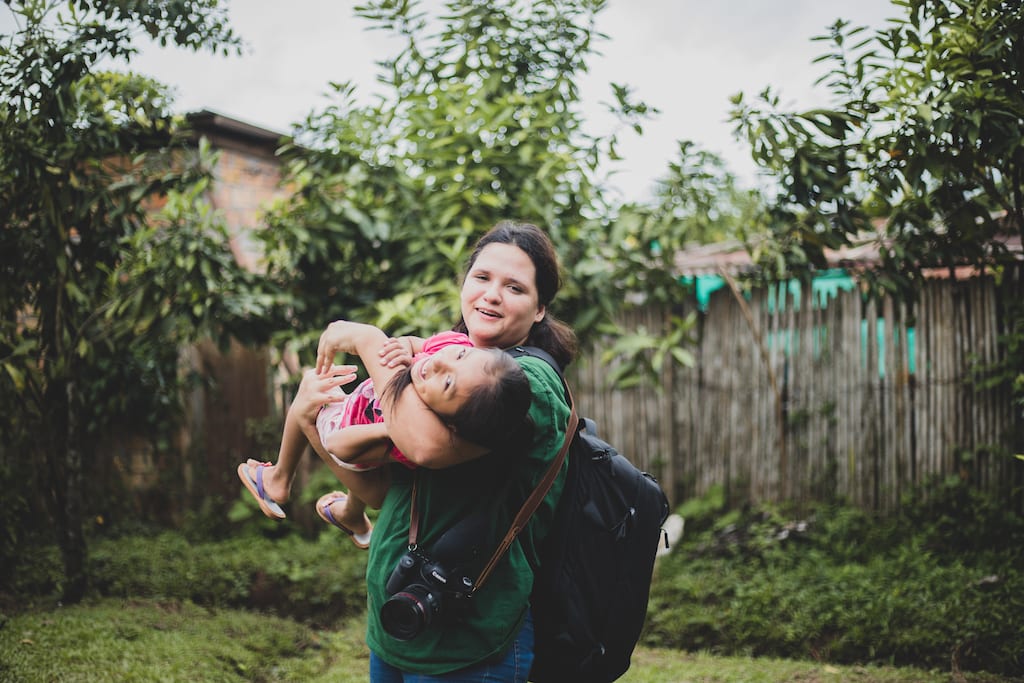
Sara playing with Compassion kids.
Children are easy to make smile. It doesn’t take much. Just a ball or the willingness to make them laugh is enough. Children are children everywhere in the world. The lightness of those who still don’t know the complexity of the adult world allows them to have fun on rainy days. It’s growing up and dealing with the frustrations of life that steals the natural smile of adults. So, when I hold my camera in my hands, I don’t often have to do much for children to close their eyes and smile.
But, sometimes, I notice something different. The most unaware, however, could ignore that behind the loud laughter, there are stories that could rip the heart of any human.
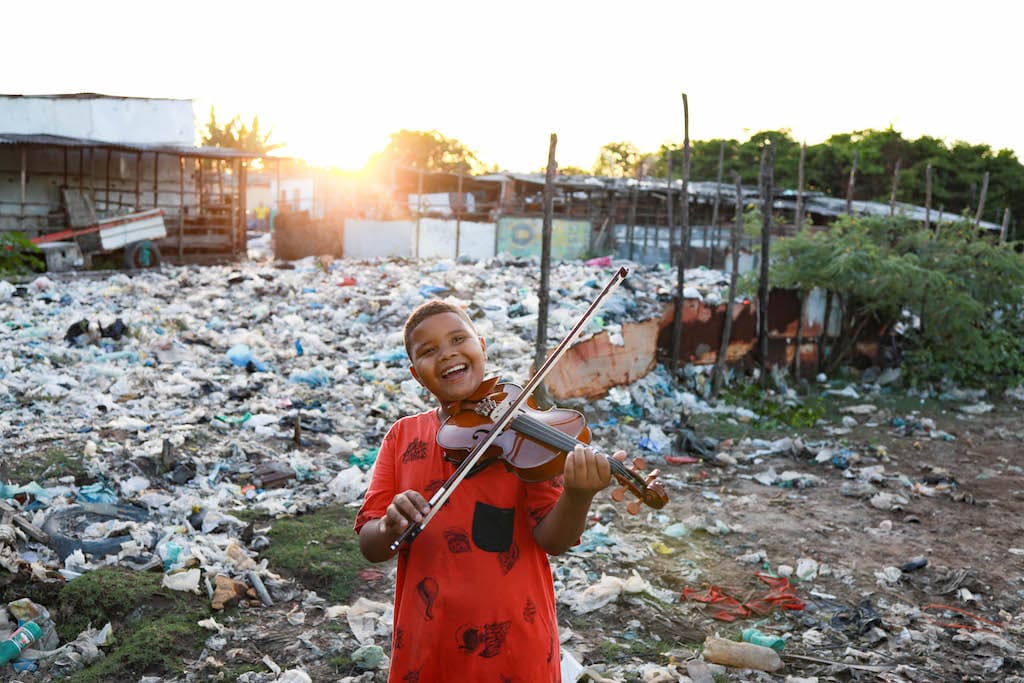
A powerful image Sara took that captures the hope and dignity in José Ricardo’s story.
Like everything in life, children are only able to learn when someone is willing to teach them. Adults are only able to care for or love if they were once taught to love. Child neglect in Brazil is more than a social problem; it’s a cultural problem in the most impoverished areas of the country. The cycle of neglect begins with others not seeing this population as human but rather as statistical numbers of an unresolved problem.
As a photojournalist who tells stories about people living in extreme poverty, sometimes it’s hard to think that our job is to show a world that shouldn’t exist. I wish my job didn’t exist if that meant poverty wasn’t a reality. That’s why when I take pictures, I want the characters of our stories to have fun. I want to leave something with them. It’s not just a job.
Nico Benalcazar, Ecuador
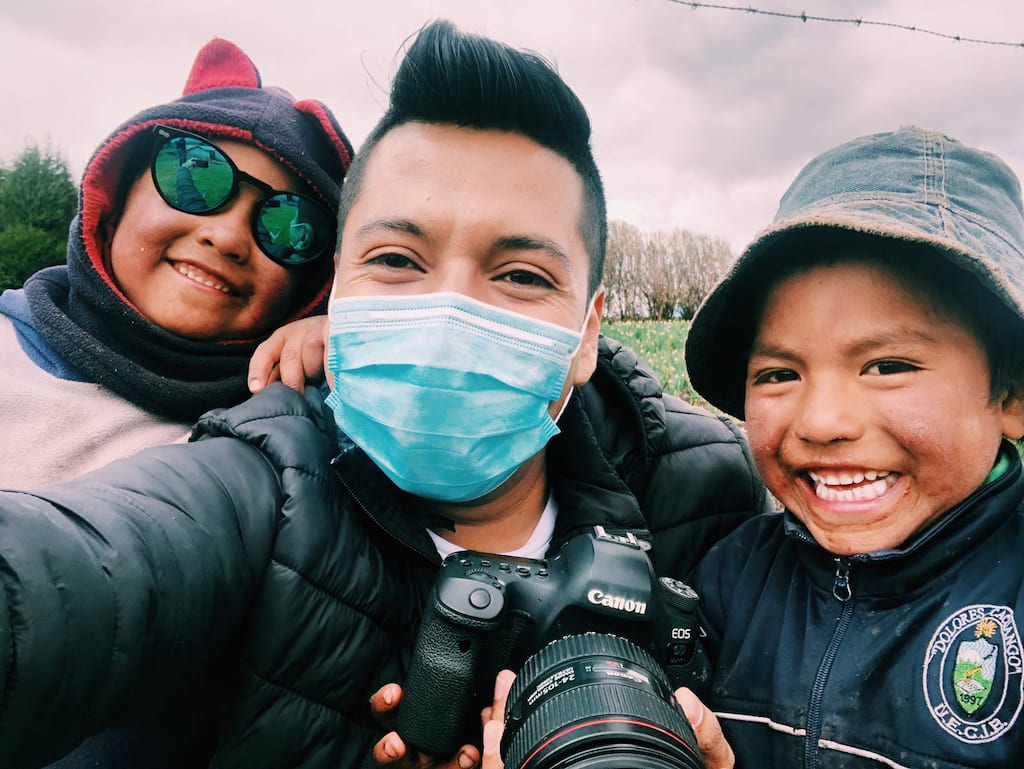
Nico capturing the hearts and stories of children.
People often ask me, ‘Doesn’t it make you sad to write confronting stories and take heartbreaking pictures?’ In the beginning, I asked myself the same thing. Now, after countless long trips to the depths of the jungle, to the top of immense mountains or the warmth of the balmy coast, there is nothing more beautiful than experiencing the deep, immense warmth of children’s hearts.
People also ask me, ‘How do you not feel guilt or pain when you have to photograph the hard challenges of a family in need?’ The truth is, you always feel guilt or pain. Those feelings are present every time I take a plane, get on a bus or board a canoe. I am often afraid of the reality that I will soon face. But all that changes when I see the smile of a child.

Nico captured this beautiful photo of Brittany, which was featured in this blog on gratitude.
After a long and tiring journey, everything lights up as the children run towards me, smiling and jumping. My fear disappears, doubts and sadness evaporate and my heart feels peace and joy, knowing the incredible stories of so many children who smile and have hope. Because when you meet these children and their families, you finally realize the purpose of the trip: to capture hope at its purest.
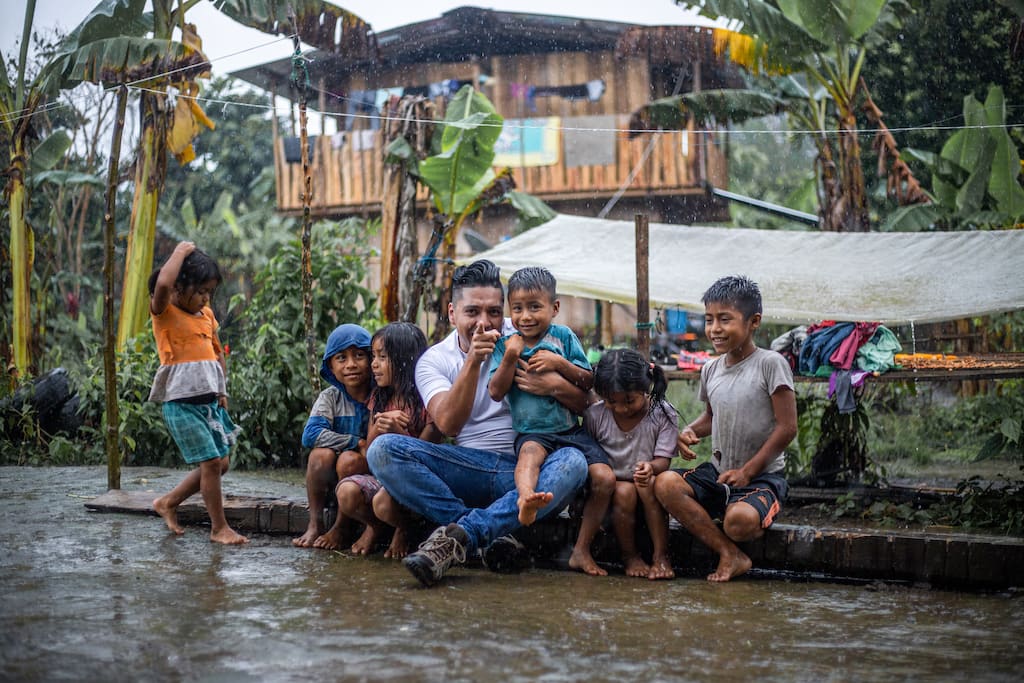
Nico sits in the rain with some Compassion kids as he captures their stories.
For several years now, I have had the privilege to be a photojournalist and learn from the families I meet on these trips. I can humbly say that children are the best teachers in life.
Tigist Gizachew, Ethiopia
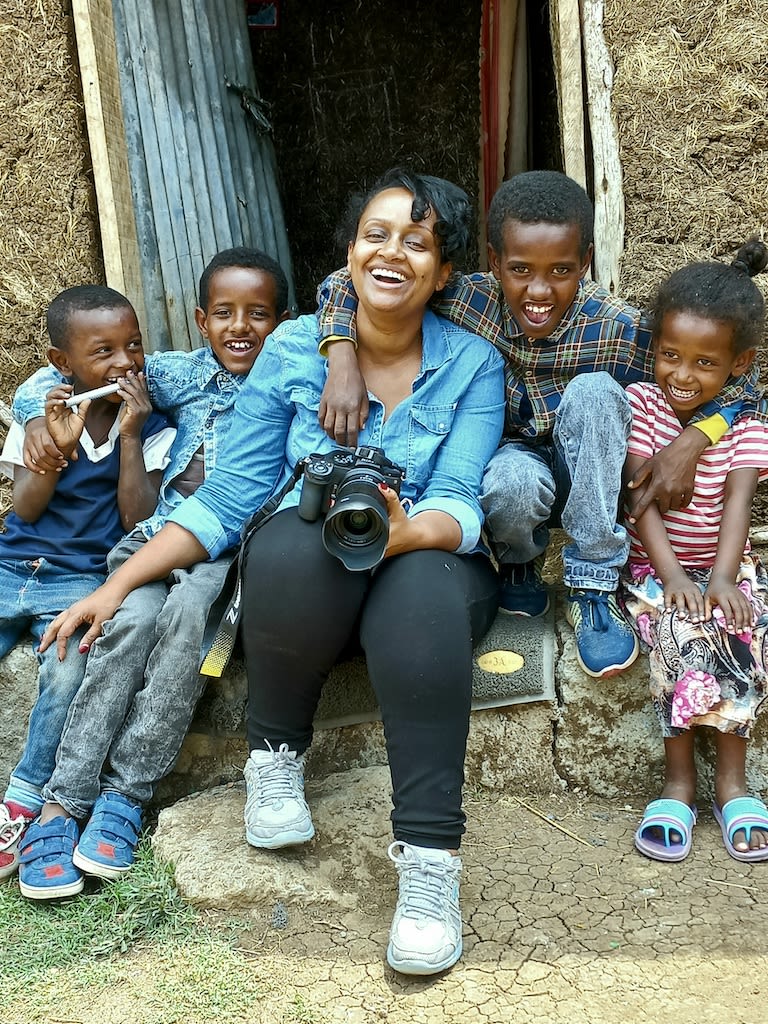
For years, I have experienced the warm welcome of children and families when I’m a total stranger to them. I’ve been honoured to gain their trust enough to let me into their stories—their struggles, triumphs and hopes. I’ve laughed, cried and prayed with them. And writing their stories in a manner that captures their dignity and affirms their place as children of God has sent me back into the Potter’s hands.

Tigist captured this photo of Abel along with his story of overcoming cancer. Read his story on our blog.
Whenever I sit down with a mother to hear her story and in the quiet of my car as I travel back home, God begins to rework and mould me. I leave with a million questions in my head—questions directed not to the mothers or the children I interviewed but to the One who orchestrates everything to His glory. My all-time question—the first one I ask is: ‘Why God? Why did you want me to listen to that?’
Sometimes, heavy emotions take time and energy to process. I also carry the excitement of witnessing a transformed life and a revived hope with me. Beyond the questions and the emotions, there is always a whisper confirming that I serve the God that sees, hears and rends the heavens to answer the cry of the weary and the destitute.

A compelling photo of Fatuma and her son, Nur, that Tigist took while capturing the story of how the global food crisis has impacted families.
In my 15 years of serving as a storyteller with Compassion, each story has left a mark on me—especially the stories of mothers who have persevered to sustain their children and ensure a bright future for them through the church and the Compassion centres. Every opportunity I get to interact with people is a chance to live out my faith. Through my work and listening to these stories, I have learned to be intentional in loving, speaking life, giving hope, being a voice and standing with those who need me.

A heartwarming photo Tigist took of Daniel.
I want to encourage you to do the same. You and I don’t know how our words and smiles will impact the people we meet. I have learned that every story belongs to God, and I acknowledge His loving hand on the stories of the people I meet. Because I have also learned that there are no lost causes with God. Our sovereign God designs everything for His glory. There are no lost or missed opportunities.
Our photojournalists live out the commitment to dignity, honesty and care in telling the stories of children. Every story is unique and a powerful testament to the potential and hope that lives in every child. These photojournalists inspire all of us to uphold the dignity of children in all our actions.





